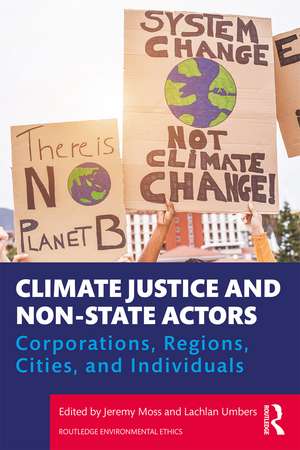Climate Justice and Non-State Actors: Corporations, Regions, Cities, and Individuals: Routledge Environmental Ethics
Editat de Jeremy Moss, Lachlan Umbersen Limba Engleză Paperback – 3 iun 2020
The climate justice literature remains largely focused upon the rights and duties of states. Yet, for decades, states have failed to take adequate steps to address climate change. This has led some to suggest that, if severe climate change and its attendant harms are to be avoided, non-state actors are going to have to step into the breach. This collection represents the first attempt to systematically examine the climate duties of the most significant non-state actors – corporations, sub-national political communities, and individuals.
Targeted at academic philosophers working on climate justice, this collection will also be of great interest to students and scholars of global justice, applied ethics, political philosophy and environmental humanities.
| Toate formatele și edițiile | Preț | Express |
|---|---|---|
| Paperback (1) | 294.05 lei 3-5 săpt. | +14.32 lei 5-11 zile |
| Taylor & Francis – 3 iun 2020 | 294.05 lei 3-5 săpt. | +14.32 lei 5-11 zile |
| Hardback (1) | 1002.95 lei 6-8 săpt. | |
| Taylor & Francis – 26 mai 2020 | 1002.95 lei 6-8 săpt. |
Preț: 294.05 lei
Nou
Puncte Express: 441
Preț estimativ în valută:
56.27€ • 58.53$ • 46.46£
56.27€ • 58.53$ • 46.46£
Carte disponibilă
Livrare economică 24 martie-07 aprilie
Livrare express 08-14 martie pentru 24.31 lei
Preluare comenzi: 021 569.72.76
Specificații
ISBN-13: 9780367368920
ISBN-10: 0367368927
Pagini: 200
Dimensiuni: 156 x 234 x 16 mm
Greutate: 0.24 kg
Ediția:1
Editura: Taylor & Francis
Colecția Routledge
Seria Routledge Environmental Ethics
Locul publicării:Oxford, United Kingdom
ISBN-10: 0367368927
Pagini: 200
Dimensiuni: 156 x 234 x 16 mm
Greutate: 0.24 kg
Ediția:1
Editura: Taylor & Francis
Colecția Routledge
Seria Routledge Environmental Ethics
Locul publicării:Oxford, United Kingdom
Public țintă
PostgraduateCuprins
Introduction Lachlan Umbers (UWA) and Jeremy Moss (UNSW) Chapter 1: Levels of Climate Action Garrett Cullity (Adelaide) Chapter 2: Sub-National Climate Duties: Addressing Three Challenges Lachlan Umbers (UWA) Chapter 3: Carbon Majors and Corporate Responsibility for Climate Change Jeremy Moss (UNSW) Chapter 4: Sectoral responsibility for climate justice: is aviation exceptionalism defensible? Elisabeth Ellis (Otago) Chapter 5: Corporations’ Duties in a Changing Climate Stephanie Collins (ACU) Chapter 6: Individual Climate Justice Duties: The Cooperative Promotional Model & Its Challenges Elizabeth Cripps (Edinburgh) Chapter 7: Are We Morally Required to Reduce Our Carbon Footprint Independently of What Others Do? Susanne Burri (LSE) Chapter 8: Right-Leveling Indeterminacy: Environmental Problems, Non-State Actors, and the Global Economic Market Benjamin Hale (UC-Boulder) Index
Notă biografică
Jeremy Moss is a Professor of Political Philosophy at the University of New South Wales, Sydney. His main research interests are in political philosophy and applied philosophy. Current projects include: climate justice, the ethics of renewable energy as well as the ethical issues associated with climate transitions. He is Director of the Practical Justice Initiative and leads the Climate Justice Research programme at UNSW. Moss has published several books including: Reassessing Egalitarianism, Climate Change and Social Justice, and Climate Change and Justice (Cambridge University Press).
Lachlan Umbers is Lecturer in Philosophy at the University of Western Australia, Perth. He works primarily in moral and political philosophy, with a particular focus upon issues in democratic theory and climate justice. His work has been published in journals such as the British Journal of Political Science, Philosophical Studies, Political Studies, and the European Journal of Political Theory.
Lachlan Umbers is Lecturer in Philosophy at the University of Western Australia, Perth. He works primarily in moral and political philosophy, with a particular focus upon issues in democratic theory and climate justice. His work has been published in journals such as the British Journal of Political Science, Philosophical Studies, Political Studies, and the European Journal of Political Theory.
Descriere
This book investigates the relationship between non-state actors and climate justice from a philosophical perspective. Targeted at academic philosophers working on climate justice, this collection will also be of great interest to students and scholars of global justice, applied ethics, political philosophy and environmental humanities.









